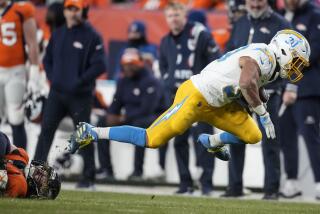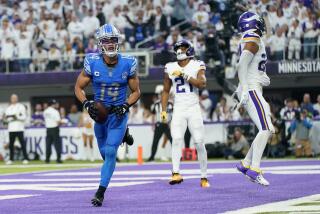How to Win
- Share via
The only certain way to win NFL games in this century is to blend a talented passer with a talented running back and a strong defensive force. At San Francisco next Sunday in a Week 9 revival of an old rivalry, the Rams plan to hold first place in the NFC West with such a team.
In Week 8, the Rams ran 37 times, passed 37 times and won with clutch defense as rookie running back Arlen Harris scored three touchdowns and quarterback Marc Bulger added one by air.
Previously a wondrous passing team, the Rams were winning their fourth in a row the balance way.
The 49ers, true, can play the same kind of football.
But the 49ers have lately been erratic, losing at Arizona last week, 16-13 (when the Rams won at Pittsburgh, 33-21) as Seattle lost at Cincinnati to fall into a first-place tie with a Ram team that has been reborn this month as a leader in conventional football. The emergence of Harris, a swift, 5-10, 212-pound undrafted free agent from Virginia, has given Coach Mike Martz that opportunity.
Few pro clubs rise to the top now without a productive running back such as Harris complementing a superb passer like Bulger. The idea on every snap is to give the defensive team two contradictory things to think about.
Miami’s Offense Gets a Passer
SPEAKING OF PASSING, running, and defense, the Miami Dolphins have been featuring a satisfactory defensive team this year and a satisfactory running back, Ricky Williams, but an unsatisfactory passer, Jay Fiedler. Unhappily for the San Diego Chargers, that situation changed Monday night when Fiedler, injured, was replaced by Brian Griese, lately of the Denver Broncos.
For the first time in his tour as Miami’s offensive coordinator, Norval Turner, one of football’s finest play-callers, could get his offense on the field.
Thus in the first 29 minutes, Griese threw three times for touchdowns. Eventually, in a game shifted to Tempe, Ariz., by the California wildfires, Griese completed 20 of 29 to pummel the Chargers, 26-10, and to serve notice that Miami will have a quarterback now for as long as Griese can hold himself together. In Denver he had come apart physically at first and then mentally.
The difference between Griese and Charger quarterback Drew Brees was that, when the game was on the line, Turner had Griese throwing on running downs — frequently first down — whereas Brees, executing a characteristically conservative game plan by San Diego Coach Marty Schottenheimer, had to pass on passing downs — frequently third and long — against the strongest pass-defense alignments a good NFL defensive team could make. And, unsurprisingly, Brees answered Griese’s three touchdowns with three interceptions, one on the third play of the game after Schottenheimer had tried to run LaDainian Tomlinson on first and second down.
So that was one thing. The other was that the Chargers lost their home-field advantage, which Las Vegas values at three points though it was worth much more this time. For, in Arizona, they don’t seem to like Californians, and from the stands they said so. Loudly.
Six-Coach Defensive Staffs
NFL DEFENSIVE IMPROVEMENT, which in recent years has been marked, is due in large part to a dramatic increase in the size of the coaching staffs. Not so long ago, three defensive staffers were enough for any team — line coach, linebacker coach and defensive-back coach. By contrast, NFL defenses are directed today by six coaches, on average, with some teams at seven.
What’s more, there are now all kinds of defensive designations that were once unheard of: defensive-end coach, defensive-tackle coach, defensive analyst, quality control, pass-rush coach, assistant defensive backs and the like.
What this means, among other things, is more individual teaching along with six or seven heads on defensive game planning, instead of three, plus six or seven to consider game-time adjustments.
The most obvious result is that the good NFL defensive teams this year can only be taken by first-rate quarterbacks — of whom, we calculated the other day, there are 24 or so at present in this 32-team league. Journeyman quarterbacks don’t luck out any more. Most pro games are battles between superior passers and superior defenses.
In such a world, competent quarterbacks can have their troubles, as Tampa Bay and Dallas proved again in Week 8 when the Buccaneers scored the only touchdown of a 16-0 game.
Dallas Coach Bill Parcells, whose five-game winning streak crashed to a halt that day, probably has the quarterback to win such a game, Quincy Carter — when Carter’s had more experience — but Parcells must see by now that he needs a more helpful running back than Troy Hambrick, who hit Tampa for 25 yards net on 11 carries. If there are three legs in a winning troika (passer, runner, defense), Parcells seems to have two of the three but isn’t likely to do it with just the two.
Vikes One Running Back Short
THE NEW YORK Giants, who will take on the Jets for the big-apple championship Sunday, aren’t due as much credit as they’re getting this week for ending the Minnesota Vikings’ winning streak in Week 8, 29-17.
Though the Vikings went into the New York game 6-0 last Sunday, it has been manifest for some time that they don’t have the running power to complement the air power they can generate with quarterback Daunte Culpepper and wide receiver Randy Moss.
It is therefore relatively easy for an above-average team, or even an average team, to defense the Vikings, who in their first five winning games caught Green Bay and San Francisco on off days and walloped Chicago, Detroit and Atlanta.
Then, running the string to 6-0 when they caught Denver four days after quarterback Jake Plummer broke his foot, they are fortunate to be leading the NFC North into November. The Vikings, 6-1 now and three games up on Green Bay in the standings, have only the Packers to beat in that division. They can still be a playoff team this year. But they don’t have the look of a conference power.
Jauron Makes a Personnel Discovery
THE CHICAGO BEARS bested the Detroit Lions last week — with a place in the cellar as first (or second) prize — in a 24-16 game that for an obvious reason was more interesting than either team has been playing. The reason is that both defenses are a cut below the NFL average.
That state of affairs gave Detroit quarterback Joey Harrington two chances at eight-point touchdowns with a pair of two-point conversion passes. He connected on both and could have sent the game into overtime with another touchdown had the Lions recovered an onside kickoff.
Chicago’s Chris Chandler likewise looked like all the quarterback you need to be a .500 team in the pro league, or even considerably more. It was Chicago Coach Dick Jauron who personally discovered him — making the personnel find of the year for the Bears. He discovered Chandler on the Bear bench.
Chandler kept Chicago ahead all afternoon with a 20-for-31 passing performance that roughly equaled the output of the more famous Harrington and exceeded him in one major respect: fewer interceptions, none to Harrington’s two.
As a 16-year pro, Chandler has wasted most of his NFL life handing off to running backs for two conservative coaches, Dan Reeves and the ultra-conservative Jauron. At the right place, under the right coach, Chandler would have won more than one NFL title. He’s a better quarterback than the defending NFL champion, Tampa’s Brad Johnson.
Broncos One Quarterback Short
THE DENVER BRONCOS are making the case for the necessity of strength in three places — at quarterback, at running back and on defense — for any team wanting to become an NFL power. The Broncos have the defense to get there and, with Clinton Portis, the running back. But they’ve lost their quarterback, Jake Plummer, whose broken foot might be more serious than they have admitted.
Foot problems are second only to arm problems for NFL passers. The career of one of the great ones, Phil Simms, who won a Super Bowl for Parcells, ended prematurely with a foot injury that kept him from ever regaining 100% condition.
In a 26-6 game, the Broncos, minus a satisfactory quarterback, couldn’t even win at Baltimore last week against rookie quarterback Kyle Boller, who, however, has had seven more weeks of experience as an NFL starter this fall than new Denver starter Danny Kanell.
It was a game in which both teams pressed home the point that in pro ball, quarterbacks have a lot to do with the success of their ballcarriers and vice versa. When the Ravens were on offense, Boller did just enough to keep the Denver defense from concentrating wholly on his running back, Jamal Lewis, who slipped away for 134 yards on 32 carries.
For Denver, Portis, on 22 carries, was held to 86 yards because the Tampa defense, focusing on that one Bronco, expended so little time and energy worrying about Kanell, who, extending a long career, has finally advanced from arena-league football to Denver’s third team.
Earlier this fall when Portis had Plummer to get in every defensive man’s sights, and stay there, he was the best running back in the league. He can’t prove that by himself. Against a strong defense, no running back can, not Lewis and, as he’s shown, certainly not Carolina’s Stephen Davis.
Best Teams Need Some Gimmick Plays
SURPRISE PLAYS HAVE a place in pro football that’s more prominent than some conservative observers will admit. With the larger coaching staffs these days (offensive as well as defensive staffs have doubled in size) there are more heads now to ponder surprise plays.
And there are more heads to calculate the length of the interval since any pro club last dusted off, say, the flea-flicker play — on which a running back fakes a run before lateraling back to his passer — and which two teams brought back last week. Most tellingly, Tampa Bay needed a flea-flicker pass by quarterback Johnson to get rid of the pesky Cowboys. The score was 3-0 when Tampa Coach Jon Gruden, surprising Dallas Coach Parcells with the game-changing blow, called for one of football’s great gimmick plays to set up the only touchdown of a game the Cowboys might have won if they had scored the game’s allotted one touchdown or if Parcells had been ready for such a gimmick.
To beat Philadelphia on Oct. 12, Parcells, you may recall, was ready for the Eagles’ gimmick play that opened the game — a surprise onside kickoff the Cowboys returned for a 7-0 lead in the first three seconds, after which they held on to win by two points, 23-21. But the real beauty of gimmick plays is that it’s difficult to be ready all the time for all of them.
Years ago I asked Vince Lombardi, the Green Bay coach who won the first two Super Bowls, why he avoided the use of all surprise plays except an occasional third-and-one pass. Replying correctly, perhaps, for his era — the run-oriented, low-scoring 1960s — Lombardi, a perfectionist who at coaching clinics could lecture for eight hours on one offensive play, said: “We believe in keeping the offense simple. We know that souped-up offenses may beat us once in a while, but mistakes decide most football games, and the team with the simplest offense and defense makes the fewest mistakes.”
In the more wide-open 21st century, many of the NFL’s most conservative coaches are still trying to win with the simplest-possible game plans executed by players who make the fewest-possible mistakes. But what Lombardi called souped-up offenses — by which he mainly meant pass offenses as well as occasional gimmick plays — are more necessary now in a free-scoring era. Lombardi himself if he were in action today would doubtless be playing West Coast football or some sort of pass-oriented football.
The year before the Ice Bowl, Lombardi converted the Packers into a passing team in the NFL’s 1966 title match to outscore Coach Tom Landry’s pass-happy Dallas Cowboys, 34-27, in one of the biggest football games ever played. Certainly it was bigger and better than the Ice Bowl, which, in 1967, Lombardi won on sort of a fluke, a quarterback sneak on an icy Wisconsin field by Bart Starr. A year earlier, Starr had beaten Dallas more legitimately with four touchdown passes on a warm New Year’s Day in Texas. In this century, the most typical of the NFL’s winning teams are going to be those that can launch scoring passes and make some surprise plays.
Bob Oates’ book, Sixty Years of Winners, is available at latimes.com/bookstore or by calling (800) 246-4042 ($16.95).
More to Read
Go beyond the scoreboard
Get the latest on L.A.'s teams in the daily Sports Report newsletter.
You may occasionally receive promotional content from the Los Angeles Times.










